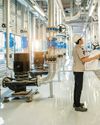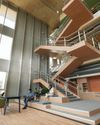試す 金 - 無料
Why healthcare architects perceive that their designdecision autonomy is decreasing
Commercial Design
|August 2022
An indepth insight into: holistic healthcare design, specialised knowledge, and healthcare architects’ professional autonomy
-

Two types of knowledge have shaped the path for the professionalisation of architecture and the contingent skills claimed by architects.
Occupational and professional powers are related to technical (i.e., the component transferable by standardisation and routinisation) and indeterminate (i.e., the non-transferable component, such as artistic initially inaccessible components of new research) elements of professional knowledge.
In architecture, technical aspects are adapted from engineering and technological fields, such as civil and mechanical engineering and computerised information.
The utilisation of technical knowledge is a significant source of income because it is an instrumental tool (e.g, BIM and CAD programmes) in carrying out architectural tasks, informed decisions and input in the early design process. Nonetheless, the progressively technical nature of professional knowledge dramatically develops deprofessionalisation.
Therefore, technical aspects may unintentionally decrease professional autonomy. By contrast, the indeterminate components of professional practice, including aesthetics and generating new scientific knowledge, might permit architects to preserve some exclusive professional autonomy.
Aesthetics is scientific and nontransferable, as knowledge cannot support evidence-based design until it is produced and shared. These contributions are essential to the users, clients, and society.
However, there are concerns about architectural knowledge domains using knowledge formalisation.
AUTONOMY
このストーリーは、Commercial Design の August 2022 版からのものです。
Magzter GOLD を購読すると、厳選された何千ものプレミアム記事や、10,000 以上の雑誌や新聞にアクセスできます。
すでに購読者ですか? サインイン
Commercial Design からのその他のストーリー

Commercial Design
RACKING THE BUILDING HANDOVER CODE
Simon Joss of KEO International Consultants and Mark Docherty of Optima, unpack the pitfalls and best practices in testing, commissioning, and handover
4 mins
October 2025

Commercial Design
MUSEUM MEETS WORKPLACE
Studio IV Designs transforms EY's Gurugram headquarters into a museum-like workplace where contemporary Indian art, craft, and architecture intersect with global corporate identity
6 mins
October 2025

Commercial Design
FORGED IN DESIGN
Studio Osmosis transforms a residential floorplate into a corporate headquarters for Stainox Alloys, forging a workplace that reflects the company's strength, precision, and enduring identity.
4 mins
October 2025

Commercial Design
Workplace without Boundaries
Roshan Gowda, GRF Regional Head, Asia Pacific at SAP, offers a behind-the-scenes look at how the company's Bengaluru campus was envisioned, not just as an office for 15,000 employees, but as a future-ready hub of innovation and well-being.
9 mins
October 2025

Commercial Design
DESIGNING FOR WELLBEING
How light, space, and material choices impact creativity and mental health in workplaces
3 mins
October 2025

Commercial Design
ADAPTIVE REUSE
Revitalising spaces for modern needs
2 mins
October 2025

Commercial Design
THE CARBON CONUNDRUM
LEED v5 marks a radical shift from theoretical compliance to real-world performance, redefining sustainability standards for workplaces and the built environment.
4 mins
October 2025

Commercial Design
THE SICK BUILDING SYNDROME
Sick buildings are hurting well-being and productivity, and here's how FM teams can fix them with smart, energy-efficient retrofits
4 mins
October 2025

Commercial Design
AI WITH A SOUL
Roar's Tamara Taamneh is embedding AI into interiors that adapt, respond and reflect human needs in projects
2 mins
October 2025

Commercial Design
THE INVISIBLE THREAT
A look at how outdoor air pollution impacts a building's indoor air quality and the strategies that support healthier, safer workplaces
3 mins
October 2025
Translate
Change font size
